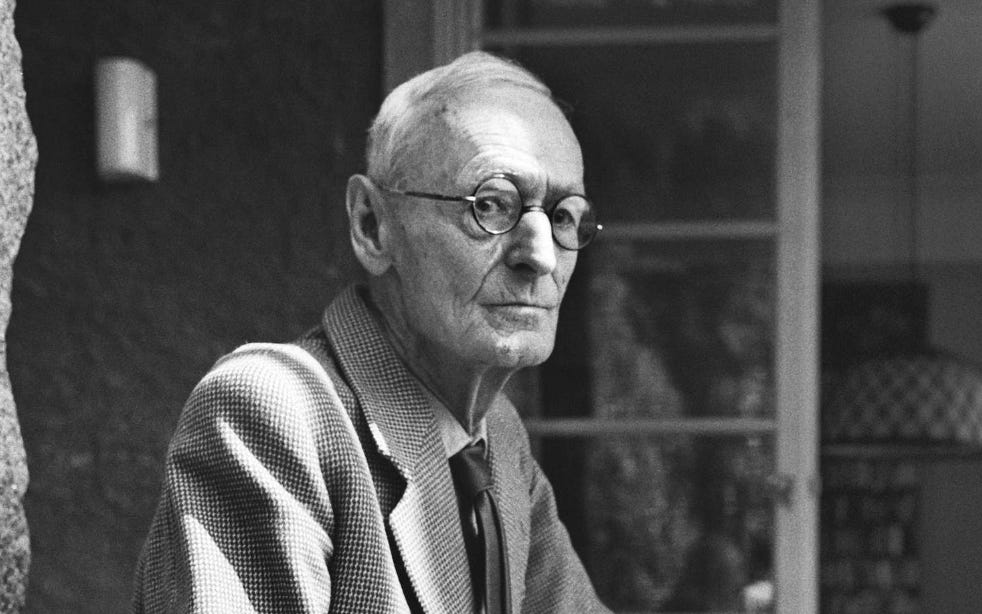Herman Hesse
Hermann Hesse was a German-born Swiss poet, novelist, and painter who became one of the most influential literary figures of the 20th century.
Hesse’s works are known for their exploration of themes such as self-discovery, spirituality, and the search for meaning in a rapidly changing world. Here is a detailed history of Hermann Hesse's life and literary career:
Early Life and Education:
1. Born on July 2, 1877, in Calw, a small town in the Black Forest region of Germany, Hermann Hesse was the son of Johannes Hesse, a pious Christian missionary, and Marie Gundert, the daughter of an intellectual family.
2. Hesse's early years were marked by a challenging and often tumultuous upbringing. His parents' strained marriage and frequent moves due to his father's missionary work had a profound impact on his childhood.
3. Despite the family's expectations for him to become a missionary like his father, Hesse showed an early affinity for literature and art. He began writing and drawing from a young age, and his creativity became an important means of self-expression.
Literary Career and Early Works:
4. Hesse's first major literary success came with the publication of his debut novel, "Peter Camenzind," in 1904. The novel is a semi-autobiographical coming-of-age story that explores themes of individualism and the conflict between societal norms and personal freedom.
5. In the following years, Hesse published several novels and collections of poetry, including "Beneath the Wheel" (1906) and "Gertrude" (1910). These early works established him as a talented writer with a unique voice.
Journey to India and Spiritual Exploration:
6. In 1911, Hesse embarked on a transformative journey to India, where he sought spiritual enlightenment and a deeper understanding of Eastern philosophy and mysticism. This trip had a profound impact on his life and work.
7. The experiences in India influenced some of Hesse's most famous novels, including "Siddhartha" (1922), a philosophical novel that explores the spiritual journey of a young man named Siddhartha as he seeks enlightenment.
World War I and Political Views:
8. During World War I, Hesse's opposition to the war and his pacifist views led to his estrangement from many of his contemporaries. He was critical of the nationalist fervor and militarism that gripped Europe during this period.
9. Hesse's pacifist stance is reflected in works like "Demian" (1919), a novel that delves into themes of personal and spiritual growth in the context of a world torn apart by war.
Magister Ludi (The Glass Bead Game):
10. Hesse's most celebrated and complex work is "Das Glasperlenspiel" (1943), also known as "The Glass Bead Game" in English. This novel, set in a future society, explores the intellectual and spiritual journey of its protagonist, Joseph Knecht, who is a master of the titular game, a symbol of intellectual and artistic synthesis.
11. "The Glass Bead Game" earned Hesse the Nobel Prize in Literature in 1946. The novel is often regarded as a masterpiece of modern literature and is considered Hesse's magnum opus.
Swiss Citizenship and Later Life:
12. In 1919, Hermann Hesse obtained Swiss citizenship, which marked a significant shift in his identity. He settled in Montagnola, Switzerland, where he lived for the rest of his life.
13. Hesse continued to write prolifically throughout his later years, producing works like "Steppenwolf" (1927) and "Narcissus and Goldmund" (1930), which further explored themes of identity, spirituality, and the human experience.
14. Hesse's influence extended beyond literature into the countercultural movements of the 1960s, where his works resonated with a generation seeking alternative lifestyles and spiritual insights.
Death and Legacy:
15. Hermann Hesse passed away on August 9, 1962, in Montagnola, Switzerland. His legacy endures through his literary contributions, which continue to be widely read and studied around the world.
16. Hesse's writings have inspired countless readers to embark on their own journeys of self-discovery and introspection, making him a revered figure in the realm of literature and philosophy.
Hermann Hesse's life and work remain relevant and influential, as his exploration of the human spirit and the quest for meaning continue to resonate with readers across generations. His ability to blend Eastern and Western philosophies, coupled with his deep introspection, make his works timeless and thought-provoking.

